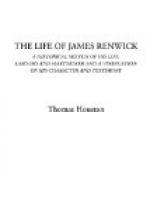for watching and taking advantage of any public movement
for overturning the present despotism, and recovering
our liberties, civil and religious. We require
to make the terms of admission strict, to guard against
spies, and those who are contentious or quarrelsome.
At the same time they declare the close and hallowed
relations that bound them to all the true disciples
of their common Lord. In a noble spirit of Christian
brotherhood, they virtually proclaim, “On the
communion of saints, let us impose no new restrictions.
Though others differ from us in the word of their
special testimony, let us embrace and love them, and
acknowledge fellowship with them as Christian brethren."[6]
In these noble utterances, we have strikingly exemplified
the true spirit of Christian brotherhood and Catholic
communion. This is the genuine import of the
vow of the Solemn League and Covenant, which binds
Covenanters to regard whatever is done to the least
of them, as done to all and to every one in particular.
While firmly holding fast all Scriptural attainments,
and contending “earnestly for the faith once
delivered to the saints,” we should cordially
rejoice in the evidences of grace in Christ’s
servants wherever we find them. We should love
them as brethren, fulfil the law of Christ by bearing
their burdens, wish them God speed in all that they
are doing for the advancement of His glory, and fervently
labour and pray for the coming of the happy period
when divisions and animosities shall cease, and when
there shall be one King, and His name one in all the
earth.
5. The testimony of Renwick and his associates
is of permanent value and of special importance in
our day, as it was directed against systems of
error and idolatry, which serve to corrupt the
Church and enslave the State. Against Popery
in every form Renwick was a heroic and uncompromising
witness. At the peril of life, he publicly testified
against the usurpation of the papist James, and rejected
him as having no claim to be regarded as a constitutional
sovereign, and as utterly disqualified to reign in
a Protestant reformed land. This was the main
ground of his objection against James’s toleration,
for which the Indulged ministers tendered obsequious
thanks to the usurper. Yet this edict of toleration
was issued for the purpose of opening the way for
the practice of Rome’s abominations, and for
the advancement of papists to places of power and
trust in the nation. None of the Cameronians
would, for any earthly consideration, even to save
their lives, for a moment admit that a papist had
any right to exercise political power in a reformed
land. Our martyred forefathers we regard as worthy
of high respect and imitation, for their deeply cherished
dread of the growing influence of Popery, and for
their determined resistance to its exclusive and extravagant
claims. The system of Popery is the abnegation
of all precious gospel truth; and is a complete politico-religious
confederacy against the best interests of a Protestant




